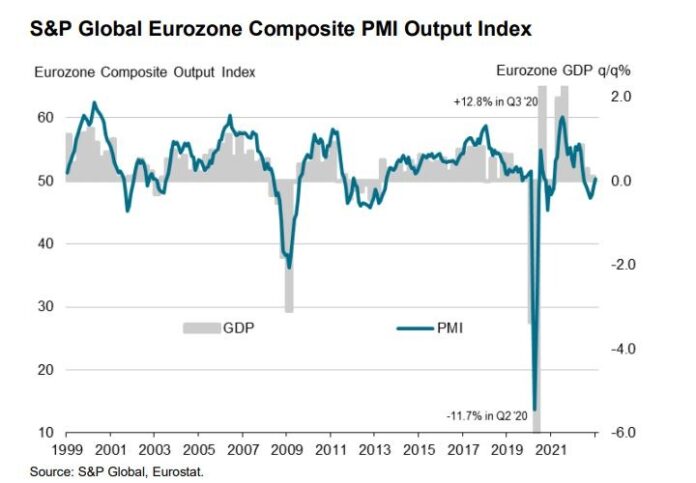
The S&P Global Eurozone Composite PMI stood at 50.3 in January 2023, slightly up compared with a reading of 49.3 in December.
The latest Global Eurozone Composite PMI reading pointed to stronger employment growth coinciding with higher levels of company activity as the labour market in the area continued to show remarkable resilience.
Total new orders fell since the summer of 2022, but the rate of decline was the softest over this period, while the rate of job creation ticked slightly higher to a three-month high.
At the same time, backlogs of work decreased, particularly in the euro manufacturing sector.
On the price front, input cost inflation continued its downward trend, easing to a 21-month low, although output prices increased at a slightly faster clip in January.
With output indexes in both sectors steadily rising since then, the most recent survey data also ominously hint that the economy hit its low point in October of last year.
Of the countries with Composite PMI data available (which together account for around 78 per cent of eurozone private sector output), Ireland registered the strongest performance in January, with output growing modestly.
During the most recent survey period, activity increased in Spain and Italy as well, but the German economy generally stabilized. Even yet, there was a slight contraction in the private sector in France.
Looking ahead, businesses in the eurozone were more upbeat about the future, especially in the coming 12 months.
“With price pressures down markedly in recent months, supply constraints easing and near-term energy market worries alleviated by subsidies, lower prices and a warm winter, business confidence has also lifted higher, adding to hopes that the upturn will gather steam in the coming months,” said Chris Williamson, the chief business economist at S&P Global Market Intelligence.
However, he said that it is still too early to entirely disregard the prospects of a recession explaining that many businesses are relying on backlogs of previously placed orders, collected throughout the pandemic, to sustain growth.
“Demand growth needs to accelerate to drive a more robust upturn, and it is worrying in that respect to see new orders continue to fall in January,” Mr Williamson added.




















